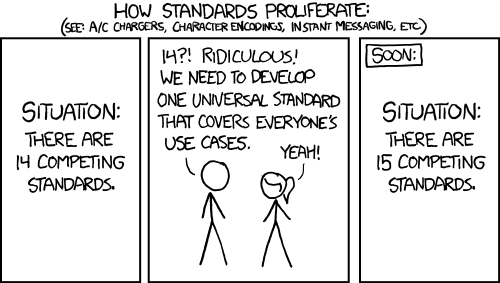As @PlasmaHH commented:
[![XKCD 927 Standards][1]][1]
XKCD: Standards by Randall Munroe, CC-BY-NC 2.5-licensed
So, no. There's not a standard, mostly because everyone has a different idea of what's the best way to do something specific with a lot of freedom in implementation. Part of the problem certainly is a lack of willingness to sit together to standardize on the side of semiconductor manufacturers – which is certainly why saying "SPI" isn't enough, but you still have to specify clock polarity and signal/clock phase – giving you four non-interchangeable, yet easily convertible SPI "versions".
Note that being the creator of a specific bus for a specific system might have enormous commercial advantages; for example, if you hold the patent describing a unique feature of that bus, you can both get rich by licensing that technology to other companies, and exclude competitors from your market. So, inventing a bus is often done either to exclude a competitor, or in an attempt to enter a market without using someone else's patented technology. [1]: https://i.sstatic.net/MUFnr.png
